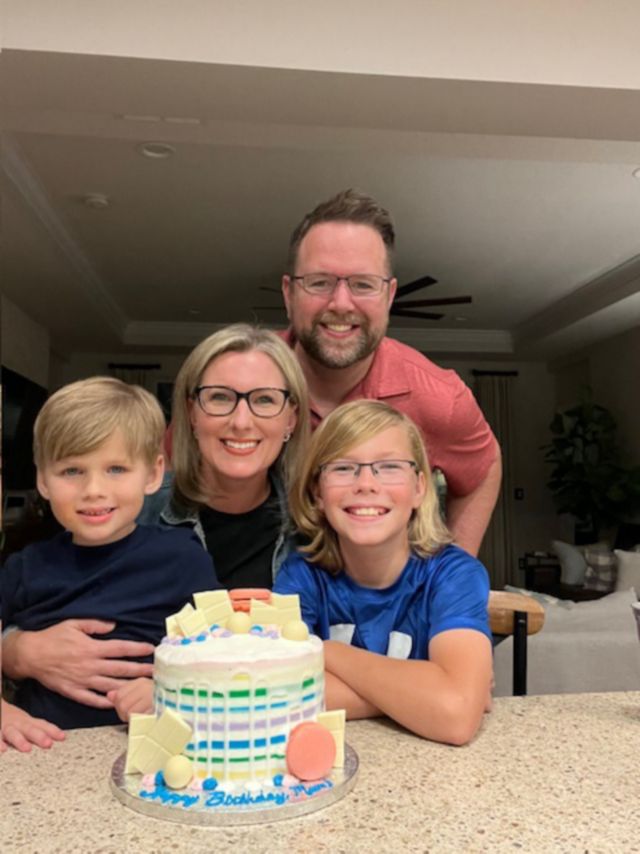St. Jude Family of Websites
Explore our cutting edge research, world-class patient care, career opportunities and more.
St. Jude Children's Research Hospital Home

- Fundraising
Cancer Predisposition Program
The Cancer Predisposition Program at St. Jude Children’s Research Hospital cares for children who have an increased genetic risk for cancer.

Our team of doctors, nurses, and genetic counselors works with families to find out if a child’s cancer might be inherited. This means the cancer happened because of a change in a gene that was passed down through their family members.
We work closely with other St. Jude doctors and researchers to find new and better ways to help families who have a higher chance than normal of getting cancer.
Your child might be referred to our program because:
- Your child has a cancer that might be linked to a specific genetic condition.
- Your child does not have cancer but has a genetic condition that raises their risk.
- Close family members have a genetic condition that increases the risk of cancer. You want to find out if your child is at risk.
- Your child has body features that could mean a greater risk of cancer.
Request an appointment:
- If your child is a St. Jude patient, have your child’s treatment doctor request a consult.
- If you are new to St. Jude, email the St. Jude Physician/Patient Referral Office: referralinfo@stjude.org.
How to prepare for your Cancer Predisposition Program visit
Find out your family health history. It is important to know the health history of parents, sisters, brothers, aunts, uncles, cousins, and grandparents, especially anyone who had cancer. If a family member had cancer, follow these steps as closely as possible:
- Ask for copies of family members’ cancer medical records to share with your child’s doctor, nurse, and genetic counselor.
- If you cannot get copies of family members’ medical records, try to find out what type of cancer they had. Ask how old they were when it was found.
- If a family member had cancer in more than 1 body part, try to find out if doctors thought it was a type of cancer that spread or different types of cancer that happened separately.
- If the cancer was in the eyes, breasts, kidneys, or adrenal glands, try to find out if 1 or both organs were affected.
- If any family members had cancer genetic testing, ask for copies of their test reports.
- Talk with your family members. Make a list of questions and concerns that you want to discuss.
What to expect at your Cancer Predisposition Program visit
A genetic counselor, nurse practitioner, and/or doctor will talk with you and your child about:
- Your child’s health and family history
- What cancer screening tests are available
- Making appointments for screening tests
- Genetic testing
- How your child’s diagnosis affects you, your child, and other family members
A doctor or nurse practitioner may also do a physical exam.

“I had very little understanding of how closely tied pediatric cancers are or could be to genetics. I thought it was environmental or maybe just bad luck.”
What happens after your Cancer Predisposition Program visit
Your genetic counselor will:
- Review your child’s health, treatment, and family histories
- Discuss genetic testing for other family members (if needed)
- Share the results of any cancer screening tests that were done
- Create a care plan for your child and other family members (if needed)
- Refer you to a specialist in your community (if needed)
If you have questions about the Cancer Predisposition Program, email GPTeam@stjude.org.
Privacy of genetic information
Genetic discrimination occurs when employers or insurance companies use genetic information to decide if someone can have a certain job or get insurance coverage.
You might wonder if you could be treated unfairly because of genetic testing. In 2008, the U.S. Congress made a law called the Genetic Information Nondiscrimination Act (GINA) to help prevent this kind of discrimination.
Another law called the Health Insurance Portability and Accountability Act of 1996 (HIPAA) protects private health information from being shared without a patient’s permission.
If you have questions about genetic discrimination or need more information, reach out to the Cancer Predisposition team for help. They can answer your questions and provide more details.
Research advancements
St. Jude has been leading the way in understanding how changes in genes passed down in families can cause cancer. In 2010, St. Jude and Washington University School of Medicine started the Pediatric Cancer Genome Project.
Things they learned from this project have helped design clinical trials at St. Jude for leukemia, brain tumors, and other types of childhood cancer. As scientists learn more, they can find new and better ways to help children with cancer everywhere. Learn more about the Department of Oncology's Cancer Predisposition Division
Read more about Cancer Predisposition Program trials:
Study goal:
The main goal of this study is to learn more about the reasons childhood tumors form and how to treat them better.
Study goal:
The main purpose of this trial is to learn about the genetic causes of cancer.
Genetic syndromes we treat
We offer confidential genetic counseling and testing for many conditions that can increase the risk for cancer. Some of these conditions are listed below: